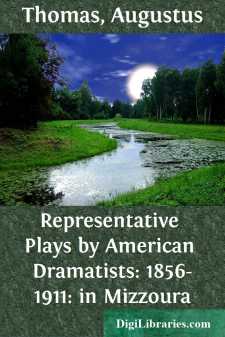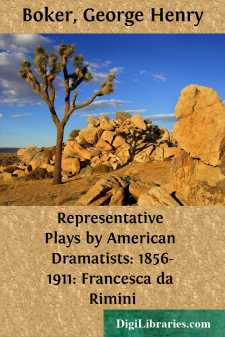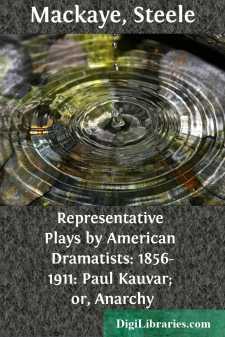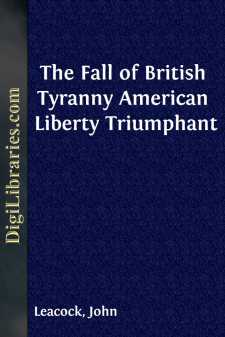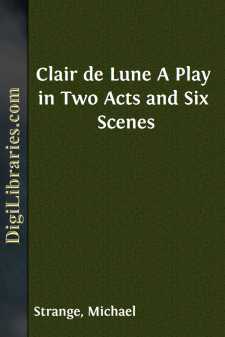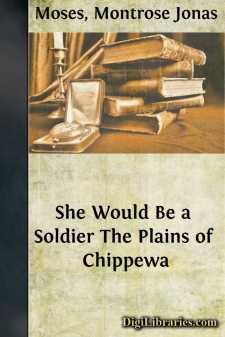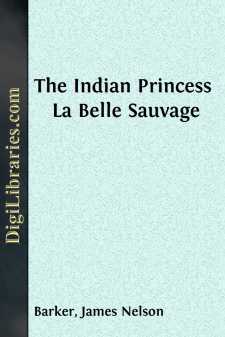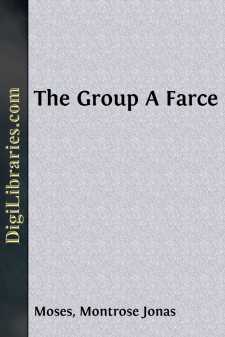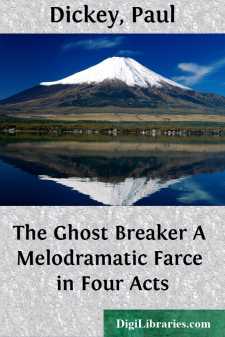Drama
American Books
Sort by:
by:
Augustus Thomas
AUGUSTUS THOMAS (Born, St. Louis, Mo., January 8, 1859) It is not a new thing for a dramatic author to write prefaces to his plays. We are fortunate in possessing a series of personal opinions in this form that constitute a valuable asset in determining individual attitude and technical purpose. Read Schiller's opening remarks to "The Robbers," Victor Hugo's famous opinions affixed to...
more...
GEORGE HENRY BOKER (1823-1890) The name of George Henry Boker suggests a coterie of friendships—a group of men pledged to the pursuit of letters, and worshippers at the shrine of poetry. These men, in the pages of whose published letters and impressions are embedded many pleasing aspects of Boker's temperament and character, were Bayard Taylor, Richard Henry Stoddard, and Charles Godfrey Leland,...
more...
by:
Steele Mackaye
STEELE MACKAYE (1844-1894) When one realizes the sociological purpose behind Steele Mackaye's "Paul Kauvar; or, Anarchy," it is interesting to note how inefficient the old form of drama was to carry anything more than the formal romantic fervour. Compared with John Galsworthy's treatment in "Strife" and "Justice," it makes one glad that realism came and washed away all...
more...
SCENE— A shabby front room in a shotgun house. A door covered by dingy portieres upstage C. Small panel window in side Wall L. Plain centre table with chairs drawn up about it. Gaudy calendars on wall. Battered piano against wall R. Kerosene lamp with reflector against wall on either side of room. At rise of curtain NUNKIE is at piano playing…. Others at table with small stacks of chips before each...
more...
by:
John Leacock
JOHN LEACOCK Among the elusive figures of early American Drama stands John Leacock, author of "The Fall of British Tyranny," published in 1776, in Philadelphia. Even more elusive is the identification, inasmuch as his name has been spelled variously Leacock, Lacock, and Laycock. To add to the confusion, Watson's "Annals of Philadelphia," on the reminiscent word of an old resident...
more...
by:
Michael Strange
Act I Scene 1 [An old park with avenues of trees leading away in all directions. Directly in background of stage there is a sheet of water fringed by willow and poplar trees. On the right and left is a high box hedge formed in curves with the top clipped in grotesque shapes mostly of birds. A statue is placed in the centre of each hedge, and beneath the statues are seats. When the curtain rises several...
more...
MORDECAI MANUEL NOAH (1785-1851) Mr. Noah was born in Philadelphia, July 19, 1785, the son of Portuguese Jewish descent, it being stated by some sources that his father not only fought in the Revolutionary Army, but was a sufficient friend of George Washington to have the latter attend his wedding. In his early years, he was apprenticed, according to the custom of the day, to a carver and gilder, but...
more...
JAMES NELSON BARKER (1784-1858) In a letter written to William Dunlap, from Philadelphia, on June 10, 1832, James Nelson Barker very naïvely and very fully outlined his career, inasmuch as he had been informed by Manager Wood that Mr. Dunlap wished such an account for his "History of the American Stage." From this account, we learn that whatever dramatic ability Mr. Barker possessed came from...
more...
MRS. MERCY WARREN (1728-1814) Most of the literature—orations as well as broadsides—created in America under the heat of the Revolution, was of a strictly satirical character. Most of the Revolutionary ballads sung at the time were bitter with hatred against the Loyalist. When the conflict actually was in progress, the theatres that regaled the Colonists were closed, and an order from the...
more...
by:
Paul Dickey
THE CAST Princess Maria Theresa of Aragon. Warren Jarvis, of Kentucky. Nita, the Princess' Maid. House Detective, Manhattan Hotel. Rusty Snow, Warren Jarvis' Colored Servant. Detectives, from Police Headquarters. Hotel Porter. Steward, on S.S. Aquitania. Carlos, Duke d'Alva. Dolores, the Innkeeper's Daughter. Vardos, Messenger to the Missing Prince. Don Robledo, a Soldier of...
more...


